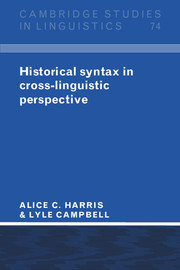Book contents
- Frontmatter
- Contents
- Preface
- List of abbreviations
- 1 Introduction
- 2 The history of historical syntax: major themes
- 3 Overview of a theory of syntactic change
- 4 Reanalysis
- 5 Extension
- 6 Language contact and syntactic borrowing
- 7 Processes that simplify biclausal structures
- 8 Word order
- 9 Alignment
- 10 On the development of complex constructions
- 11 The nature of syntactic change and the issue of causation
- 12 Reconstruction of syntax
- Appendix
- Notes
- References
- Index of languages and language families
- Index of scholars
- Index of subjects
6 - Language contact and syntactic borrowing
Published online by Cambridge University Press: 05 June 2012
- Frontmatter
- Contents
- Preface
- List of abbreviations
- 1 Introduction
- 2 The history of historical syntax: major themes
- 3 Overview of a theory of syntactic change
- 4 Reanalysis
- 5 Extension
- 6 Language contact and syntactic borrowing
- 7 Processes that simplify biclausal structures
- 8 Word order
- 9 Alignment
- 10 On the development of complex constructions
- 11 The nature of syntactic change and the issue of causation
- 12 Reconstruction of syntax
- Appendix
- Notes
- References
- Index of languages and language families
- Index of scholars
- Index of subjects
Summary
Es gibt keine Mischsprache.
(Max Müller l871: 86)Es gibt keine völlig ungemischte Sprache.
(Hugo Schuchardt 1884: 5)Introduction
As set out in chapter 3, syntactic borrowing is one of the fundamental mechanisms in the approach to syntactic change developed in this book. In this chapter, we evaluate universals (and general claims) that have been proposed in the linguistic literature concerning borrowing, we illustrate various aspects of syntactic borrowing and other changes induced by language contact, and we show how these fit in to our approach in general.
Syntactic borrowing is perhaps the most neglected and abused area of syntactic change. Excesses in the past are well known and require little comment here; more disturbing is that such problems persist even to the present day. Current views range from the extremes on the one hand, that syntactic borrowing is either impossible or is very rare, to on the other hand fanciful explanations that all otherwise unexplained syntactic eccentricities in a language may be due to foreign influence. This notwithstanding, grammatical borrowing was generally regarded as respectable and important in the history of linguistics (see chapter 2). In this chapter it is our hope to put syntactic borrowing in balanced perspective and to determine the role it must be allotted in any theory of syntactic change. We approach this task in the following way.
- Type
- Chapter
- Information
- Historical Syntax in Cross-Linguistic Perspective , pp. 120 - 150Publisher: Cambridge University PressPrint publication year: 1995
- 1
- Cited by



